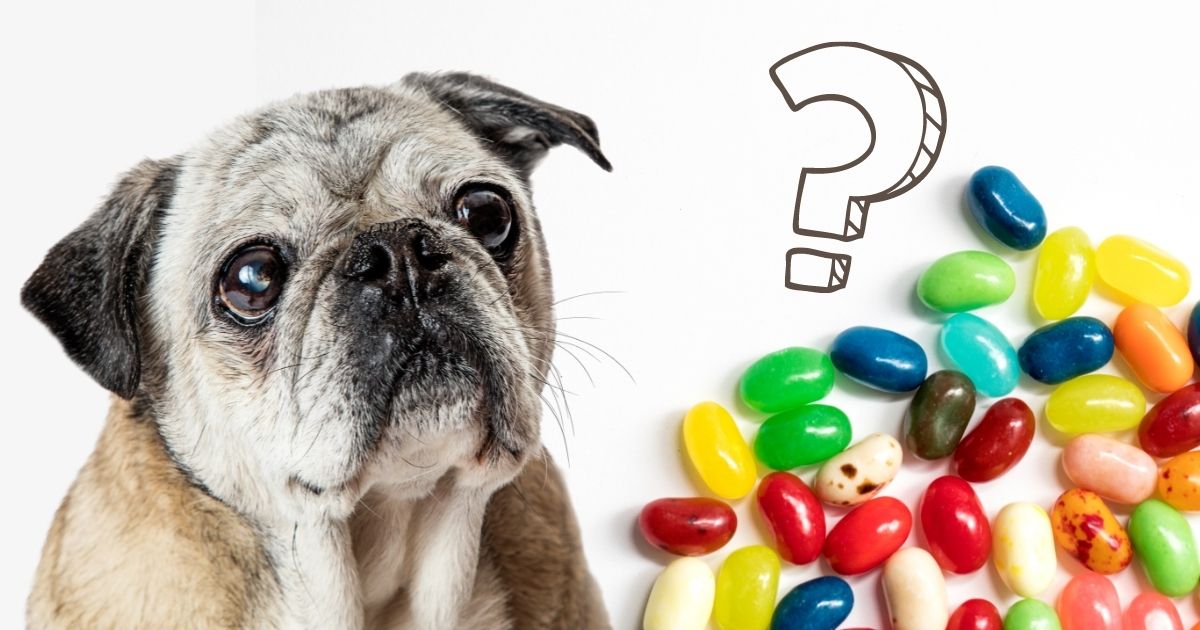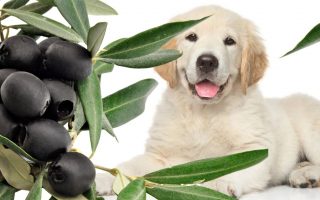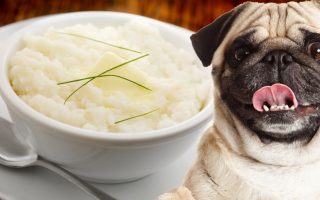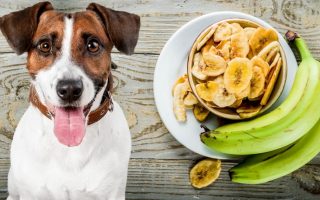Jelly beans are a typical delicacy among humans. They are small colorful bean-shaped candies with soft sugar shells and thick gelatin on the inside.
They smell nice and have a sweet taste; thus, it isn’t surprising if your dog wants a piece of these sweet treats.
However, can dogs eat jelly beans? Are jelly beans safe for dogs?
This article explores everything you need to know about dogs and jelly beans.
Can Dogs Eat Jelly Beans?
It is not recommended to feed jelly beans to your dog because they contain a variety of ingredients that could be potentially harmful to your dog’s health.
The typical components of this sweet treat are sugar, pectin, and coloring.
Also, it has a confectioner’s glaze, edible wax, and anti-foaming agents.
Additionally, each of these candies contains a different form of artificial flavorings.
Below is a nutritional breakdown of 10 small (11 grams) jelly beans. [1]
| Nutritional Facts | Amount |
|---|---|
| Calories | 41 |
| Fat | 0g |
| Sodium | 5.5mg |
| Potassium | 4.1mg |
| Carbohydrates | 10g |
| Dietary Fiber | 0g |
| Sugars | 7.7g |
| Protein | 0g |
| Vitamin A, C | 0% |
| Calcium | 0% |
| Iron: 0.1% | 0.1% |
From the chart above, it is evident that jelly beans provide little or no nutritional benefit to dogs and, yes, including humans.
Are Jelly Beans Safe for Dogs?
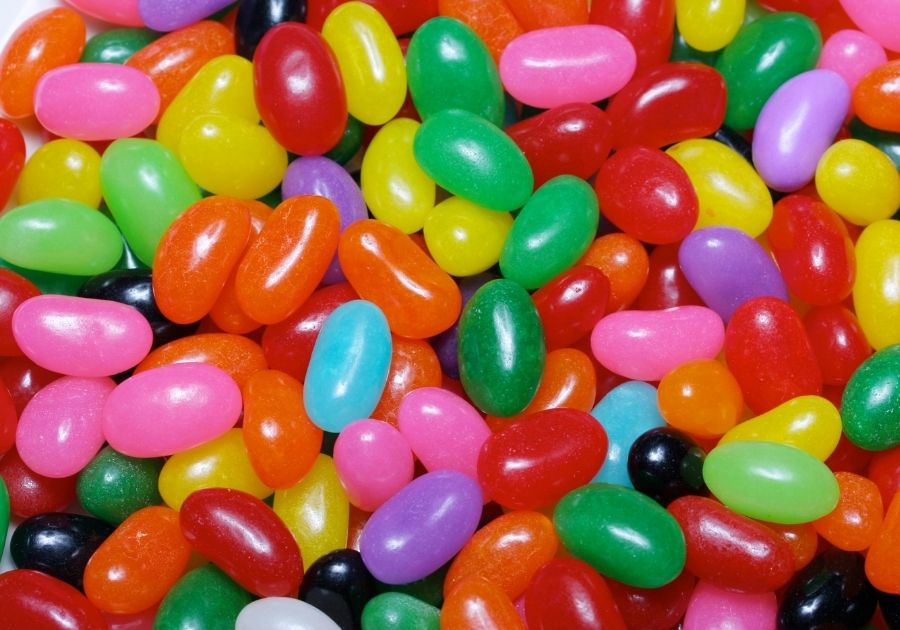
Feeding jelly beans to your dog can result in serious health complications primarily because of the ingredients it contains.
Dogs already suffering from liver disease, guts problems, obesity, diabetes, or heart-related diseases are more vulnerable.
Puppies and older dogs may also find it harder to overcome the health problems resulting from the consumption of jelly beans as they are likely to develop more severe complications.
As noted earlier, the dangers associated with dogs eating jelly beans depend on the ingredients used.
Some ingredients may pose a little health hazard, others more severe.
Here are the ingredients in jelly beans that are the biggest threats to canine health:
Sugar
As with most candies, jelly beans contain added sugar. It is its primary ingredient.
Sugar in itself isn’t toxic to dogs; however, too much of it can cause health problems.
Hence, the resulting effect of dogs consuming too much sugary content or treats are vomiting, diarrhea, diabetes, heart diseases, and unhealthy weight gain.
Dogs that are overweight are much more likely to develop painful arthritis because the extra weight puts pressure on their joints and bones.
Aside from that, sugar also causes stomach upset, painful gum and is bad for the teeth.
Xylitol
This artificial sweetener is often present in sugar-free jelly beans and other sugar-free candles.
Xylitol is toxic to dogs even when consumed in small quantities.
Feeding your dog jelly beans that contains xylitol can result in hypoglycemia, a condition whereby the blood sugar level drops dangerously low.
Signs of hypoglycemia resulting from xylitol toxicity include vomiting, staggering, lethargy, seizures, drowsiness, frequent stooling, liver failure, and coma.
If you suspect your dog has had anything containing xylitol, take it to the vet immediately.
Xylitol toxicity in dogs can lead to death if proper medical attention is not given immediately.
Pectin
Pectin is a soluble fiber used as a gelling agent in jelly beans. They are not harmful ingredients in themselves.
Some veterinary products used in treating diarrhea in dogs include small doses of pectin.
However, while pectin may not be toxic, it can cause constipation and other stomach complications in dogs if consumed in large quantities.
Caffeine
Caffeine is common in coffee, carbonated drinks, energy drinks, and some medicines.
However, it is also common in candies, including jelly beans. They are added as a stimulant, but that doesn’t make them any less toxic to dogs.
Caffeine affects dogs more severely than it would on humans. Even if a pup has a small amount of caffeine content, it may suffer from caffeine toxicity.
Some of the signs of caffeine toxicity in dogs include high body temperature, high blood pressure, restlessness, and in severe cases, seizures.
Caffeine toxicity also requires veterinary emergencies to save your pet.
The best way to protect your pet would be not to give it anything containing xylitol and caffeine in the first place.
Artificial Additives
Several artificial additives such as coloring and flavoring are used in the production of jelly beans.
Some additives are not harmful, notwithstanding, it is almost impossible to tell which additives were used, considering the countless brands of jelly beans.
Related:
Can Dogs Eat Fruit Snacks?
Can Dogs Eat Licorice Jelly Beans?
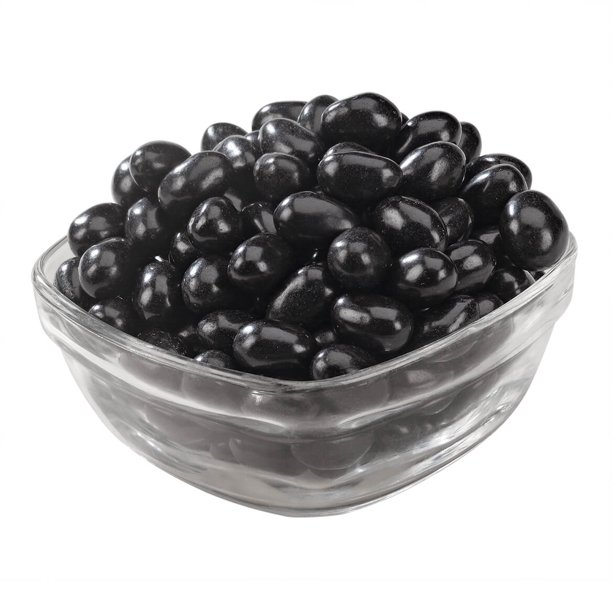
In large quantities, large licorice jelly beans are toxic to dogs.
A few bites definitely will not harm your dog, but it is best not to toy with your dog’s health and stay away from it.
If your dog has had too much licorice jelly beans, contact your vet immediately and watch out for signs of increased blood pressure.
Can Dogs Eat Jolly Rancher Jelly Beans?
Jolly ranchers jelly beans contain a lot of artificial flavors and colors; hence it isn’t ideal for feeding your canine buddy. Best stay off it.
Can Dogs Eat Starburst Jelly Beans?
Although starburst jelly beans are sweetened with apple juice and apple is safe for dog consumption, it doesn’t make them any less harmful.
Starburst jelly beans are also made with artificial colors and flavors; hence they can be toxic to dogs.
If your dog accidentally eats them, watch out for any strange behavior and allergic reaction, but most importantly, contact your vet.
Can Dogs Eat Jelly Belly Jelly Beans?
The jelly belly is among the popular brands of jelly beans products. They are not a suitable treat for dogs as they contain too much sugar.
Hence, it would be best if you kept them away far from your pet friend.
My Dog Ate Jelly Beans, What Shoud I Do?
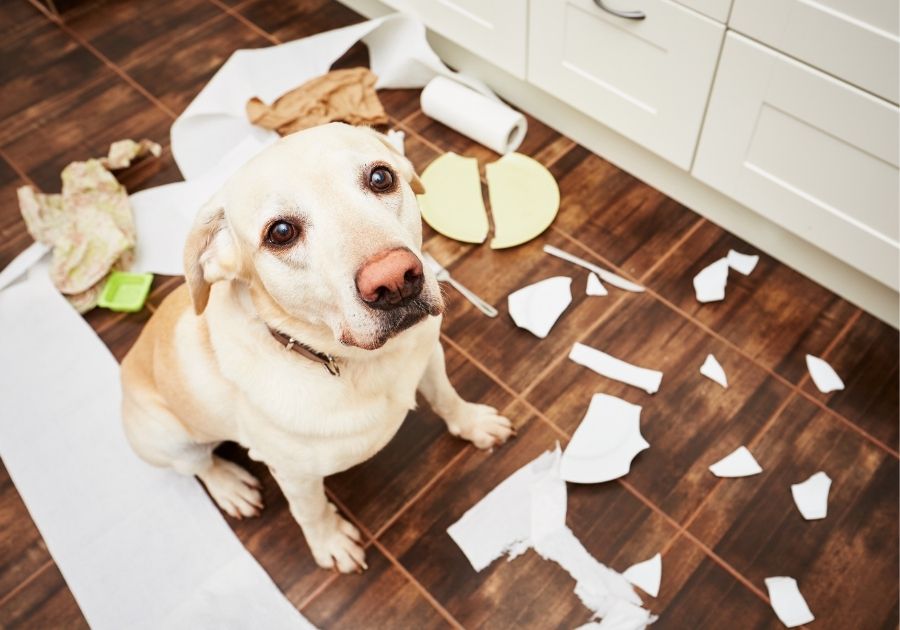
Being responsible dog parents doesn’t mean mistakes wouldn’t happen.
In the event your furry friend ingests some jelly beans, here’s what you should do.
Take up the label pack of the jelly beans your dog has consumed and go through the ingredients list for potentially harmful ingredients such as xylitol and others mentioned above.
If you notice there are potentially harmful ingredients written in the list, then an immediate trip to the vet is necessary.
However, if your dog ate only a few bites of jelly beans, it’s likely to be okay.
Still, it would help if you keep watching for any change in its behavior for the next 48 hours.
If you notice any change, do not delay in contacting the vet.
Can dogs eat jelly babies?
Compared to jelly beans, jelly babies are less harmful, but that doesn’t mean that they are safe for dogs consumption.
They also contain a high amount of sugar; hence it is not ideal for feeding your dog.
Can one jelly bean kill a dog?
Likely a single pea of jelly beans may not kill a dog.
However, even when consumed in small amounts, jelly beans containing caffeine or xylitol can be dangerous to a dog’s health.
Bottom Line: Can Dogs Have Jelly Beans?
In summary, jelly beans are not safe for your dog. They contain a high amount of artificial ingredients that are detrimental to a dog’s health.
As a loving dog parent, you should keep these treats away from your furry friend.
And if your pet dog gets creative and winds up devouring some jelly beans, contact your vet for medical advice and assistance.
You May Like:
Can Dogs Eat Caramel?
References:
[1] Nutritionix: Calories in Jelly Beans

